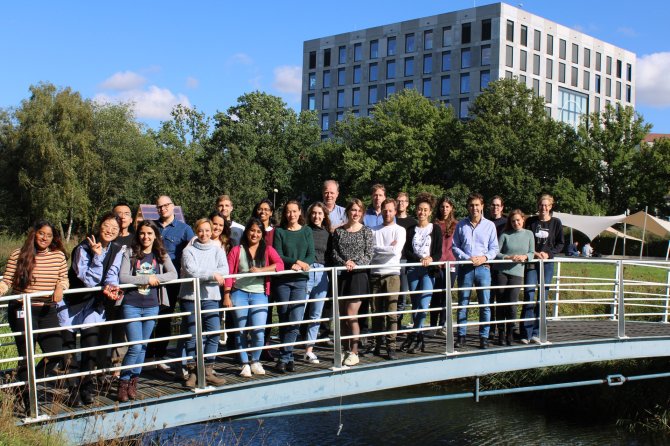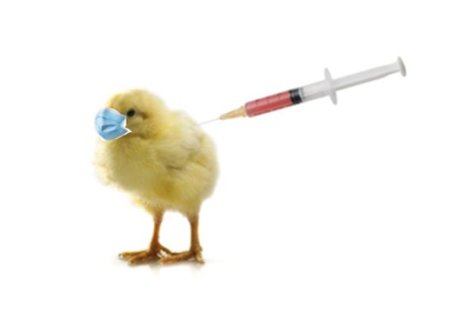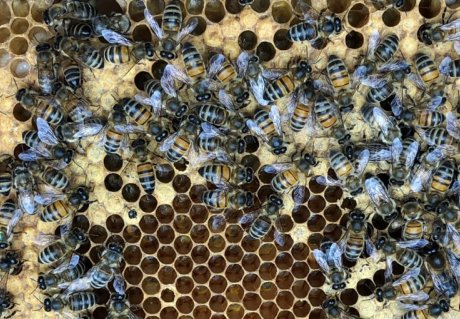
Moments to Celebrate
WIAS magazine - Summer edition 2022
Special Article
Yay! Our final edition of the year is here. We’re very happy to announce that this Summer edition of the WIAS magazine marks our first year anniversary *insert party whistle sound*. Time to celebrate! In the past year, we as board have raised our glasses to the publication of each edition, although this Summer edition holds a special place in our hearts. What were your moments to celebrate this year? We have asked this question to WIAS chair groups. Read their answers below!
Read here what each chair group has to celebrate
Animal Nutrition (ANU): a group that thrives on passion for research and teaching and is always eager to be helpful to each other and others
This past academic year, despite all corona-related challenges, ANU had many moments worth celebrating. We cannot name them all, but here is a selection:
First of all, we are proud that Wouter Hendriks may serve our University for a 2nd term as Dean of Research. Subsequent we are very pleased and grateful that in the meantime Walter Gerrits wants to lead ANU as chair holder.
Of course we also celebrated the graduations of our PhD candidates Yixin Hu, Gavin Boerboom, Lyu Fang, Fang Wang, Lotte Stokvis and Michel Verwoolde.
We cried that we had to say goodbye to our Postdocs Huyen and Kelly, but celebrated that they both have found/kept nice jobs in the Netherlands, so we can still meet them regularly.
ANU is proud that Sonja, Walter, Alfons and Paul organized a magnificent 15th International Symposium on Digestive Physiology of Pigs (DPP2022) in Rotterdam. And also our pensionado Thomas fantastically organized the 2nd Feed Technology Congress in cooperation with others.
And while looking back on this odd year, we also have had some beautiful moments when one of our secretaries was murdered and a number of staff members, like good detectives, were able to catch the culprit. And that entirely online!
After working for many months almost all completely from home, we celebrated not only that we could return to Zodiac but also that we were able to celebrate Tamme’s 40th jubilee in Onder de Linde, and also two retirement parties: one for John Cone and one for Leo den Hartog. All people who mean and have meant a lot to ANU and ASG.
We could go on for a long time, it might have been a really challenging year in many ways, but still one with marvelous moments to celebrate.
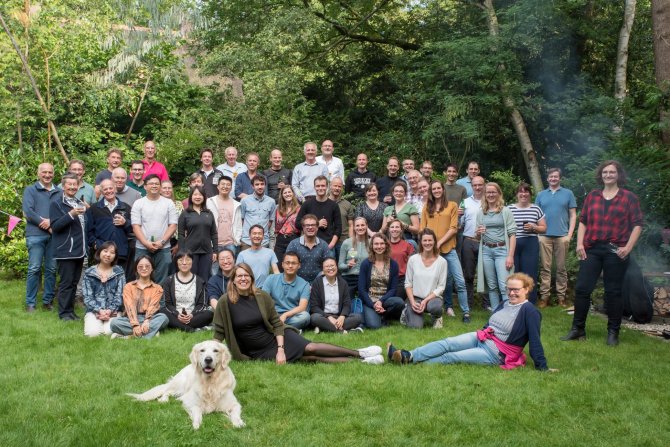
Animal Breeding and Genomics (ABG) is a very diverse
group of talented people with different (research) backgrounds: we take pride in our research, but also in our commitment to diversity and strong sense of community
group of talented people with different (research) backgrounds: we take pride in our research, but also in our commitment to diversity and strong sense of community
Given that Animal Breeding and Genomics (ABG) consists of several focus groups, all with their own expertise, we thought we would take this opportunity to highlight not just one, but three accomplishments that we view as ‘moments to celebrate’ (or, to phrase it somewhat less formally, achievements that deserve a little happy dance).
Sipke Joost Hiemstra, Genetic Diversity: “One highlight was that the Centre for Genetic Resources (CGN) has started a renewed and substantially larger Statutory Research Tasks (WOT) programme on the conservation and sustainable use of genetic resources, funded by the Dutch Ministry of Agriculture. WLR-ABG carries out part of the CGN programme that is dedicated to livestock and aquatic resources, and we’re very proud of that.”
Jan van der Lee, International: “I would like to point out the training for dairy farm advisors in Ethiopia that our colleague Adolfo Alvarez Aranguiz organized. In four batches, he trained 115 advisors on basic principles of dairy farming and efficiency in the use of own feed resources. Translating this essential knowledge into action is essential in their advisory work with farmers, for it enables farmers to increase their animals’ reproduction and production. We’ve received very positive feedback on the training; one of the project leaders described it as ‘a major boost for our professionalization agenda’ and ‘a contribution for the dairy sector’.”
Finally, this year’s World Congress on Genetics Applied to Livestock Production (WCGALP) really was the highlight of the year for ABG. It was a great success, thanks to the contribution of everyone involved (and especially Yvette de Haas and Roel Veerkamp).
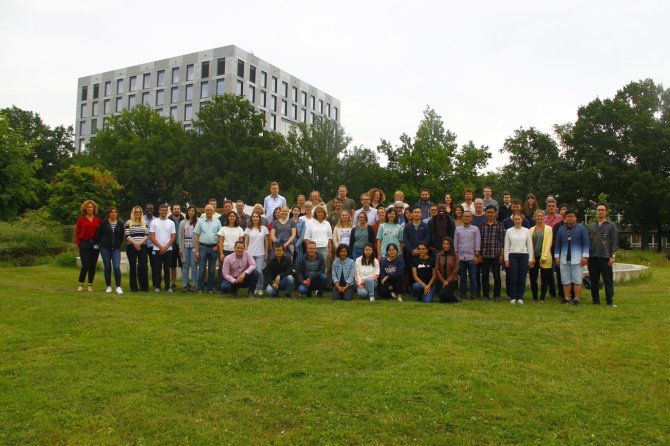
The Aquaculture and Fisheries (AFI) group is a highly biodiverse group in both its approach to study ‘fish’ from molecule to population, and in its team of senior scientists and PhD students originating from all over the world.
A summary to celebrate our past academic year for sure must start with the first post-covid19 BBQ moment together, outside in a sunny garden. Long awaited and much appreciated. The summary also includes quite a large number of PhD students performing in front of a live (!) audience again; it is so much better to watch the candidate in person, nervous and relieved. Then, the first time real meet of several new colleagues who started their position during lock-down, be it new staff or several new PhD students. The short quote already described AFI as now highly biodiverse; the group hosting new scientists who go into the fine details of healthy fish’ white blood cells, marine protected areas in Indonesia and the Dutch Caribbean; sustainable aquatic food systems, low trophic aquaculture of mussels, microbes as central determinants of about everything in universe, and more. Don’t forget "Life below water" as one of the Sustainable Development Goals. An absolute highlight of 2022, of course, has been the WIAS Annual Conference where AFI - in a Collective Action - presented the best scientific publication, best oral presentation, and best poster presentation. And last but not least, this years’ summary also includes two WIAS PhD workshops organised by AFI, one on Fish Immunology, and one on Fish Nutrition: there are no better events than such workshops to boost your motivation and look forward to the year ahead.
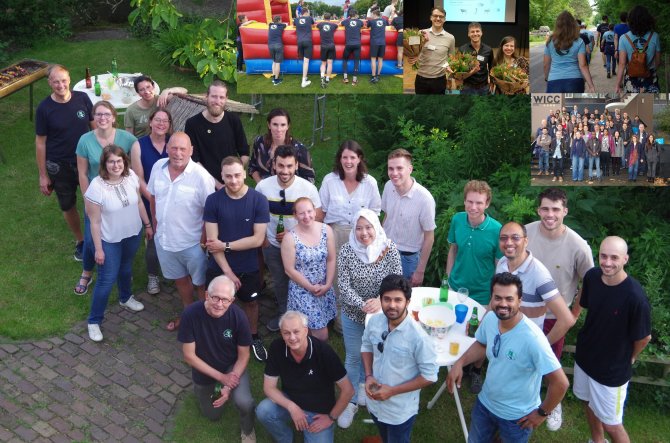
Adaptation Physiology (ADP) group is a A Diverse and Passionate group studying the ability of animals to adapt to challenging conditions
ADP is an international group of researchers, research assistants, and PhDs, actively involved in education, research, and societal debate. Adaptation is studied within our group from various scientific disciplines, including immunology, reproductive physiology, energy metabolism and behavioural biology.
We had several significant achievements last year of which we can be proud of. ADP courses were highly valued by MSc students and within the peer review. We had a very successful and well received first run of the course Sensor Data in Animal Science for MSc students. Moreover, we were delighted to obtain the WIAS education price for the PhD course Fundamentals of Animal emotion in which we are involved.
We currently participate in several important research projects, such as Healthy Livestock, focussing on reduction of antimicrobial resistance in pigs and poultry, PPILOW, aiming to improve animal welfare of poultry and pigs reared in organic production systems, IMAGEN, targeting improvements in animal health and welfare by using artificial intelligence systems. Moreover, we develop within NLAS-P3 Sensor a novel wearable sensor system (EnergyTag) for real-time monitoring of animal’s energy expenditure. We finished ‘Customised lactation length’ in which science and practise were nicely combined to study extension of lactation length in dairy cows. We had international media attention after finalizing the SmartResilience project where we found that facilitating natural behaviour in alternative housing systems of pigs promotes resilience.
Last but not least, we enjoyed a nice team building event again where we were challenged with a competition and had a nice dinner afterwards.
We are looking forward to what 2022 will bring us!
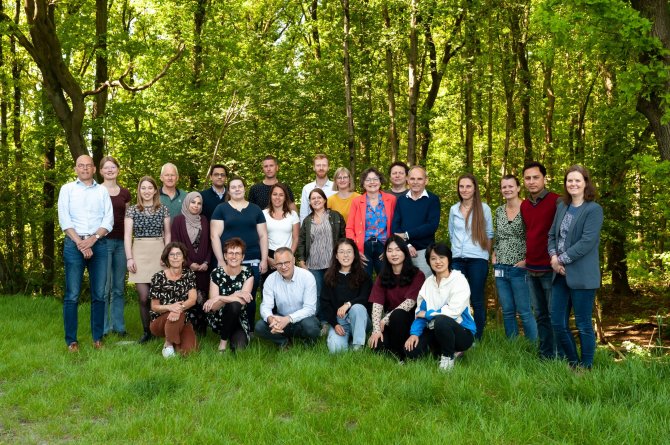
The Animal Production Systems group (APS) explores and
analyses the roles of animals in food systems with the aim to make these food systems more sustainable
analyses the roles of animals in food systems with the aim to make these food systems more sustainable
This year we celebrated that Simon Oosting was appointed as professor and chair of APS, that Eddie Bokkers was employed at the WUR for 25 years and that several PhDs defended their thesis successfully: Robin Crossley, Margret Wenker, Louise Kremer and Windi AlZahra. Some colleagues also received awards: Imke de Boer for her work on sustainability (duurzaam lintje), Alice Scaillierez for best oral presentation at the WAFL conference and Laura Webb co-organised what was considered the best PhD course last year: ‘Fundamentals of Animal Emotion’.
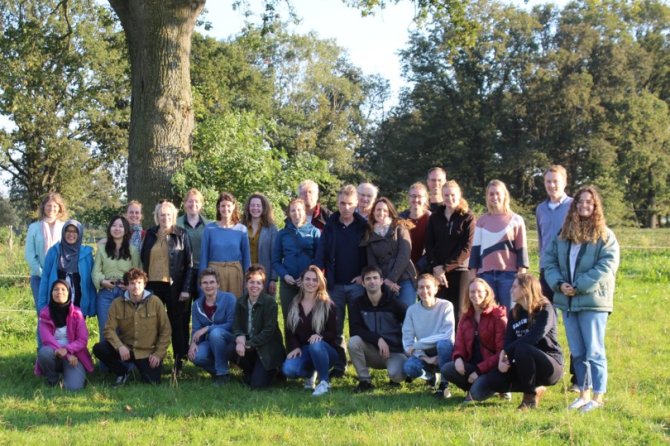
QVE-fever: Nothing more contagious than the study of contagion
In the past year, the quantitative veterinary epidemiology (QVE) group has expanded greatly and welcomed many new colleagues. We are very pleased to see QVE grow and enjoy all the new insights these fresh faces bring to our group. Only one colleague has left us, because she successfully defended her PhD and has gone on to a new adventure. QVE has not only expanded in number, but also in visibility. Several researchers in our group have been on the national news, radio, and talk shows to provide insights into the transmission dynamics of SARS-CoV-2 discuss the potential effect of measures and explain scientific concepts of disease transmission. They were asked as experts on a broad range of topics from bees smelling COVID, to R0 estimations, avian influenza and policy decisions.
In addition to these science communication activities, we have also celebrated the receipt of the award for best quantitative genetics paper 2021 in the journal ‘Genetics’, by one of our brilliant PhD candidates. We had a great group of MSc students in our modelling course (Managing Infectious Diseases in Animal Populations) that tackled challenges in animal disease control, including rabies in domestic dogs and bovine tuberculosis in cattle and deer. Earlier this month, we celebrated the past year at our end-of-year garden party with some exotic food and drinks and took a moment to celebrate the great moments we shared with two colleagues that will leave us soon after the summer.
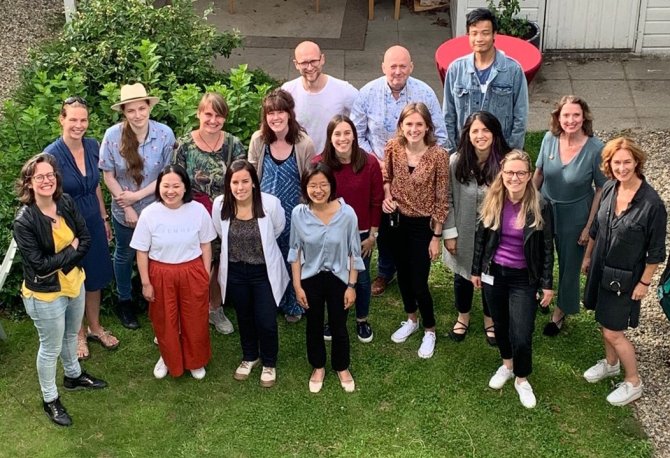
The Host-Microbe Interactomics (HMI) group is a fun group where great science and good cooking meet
At HMI, we always find a reason to celebrate, for events big and small:
We welcomed many new PhDs into our group, for example working on Streptococcus suis in pigs, gut immunity in zebrafish, or the SPRINT project, where we study the effect of pesticides on soil, animal and human microbiomes. Host-Microbe Interactions can be found everywhere! The knowledge that we will always have our microbes to keep us company kept us going through every lockdown.
Of course, as soon as we had to get up one hour early to be present (and presentable) for our Monday morning lab meetings in person again, we brought tompoucen en soesjes to celebrate and catch up with one another.
In our lab outing, a search for a staff member who disappeared and was on the run for a big bad “geldwolf” (money grabbing-) company caused much laughter! Like all good stories it ended well and with a nice terrasse dinner.
No joy without the occasional tears. The last year we had to say goodbye to several colleagues. Our great research tech-team Anja and Nico, who were part of the furniture already in the old Zodiac, retired, and our work horse Ellen Kranenbarg-Stolte, who went all the way across the hall to join EZO. Of course, we couldn’t send those people off without a great celebration!
We’re looking forward to hopefully many more celebrations for the rest of 2022!
